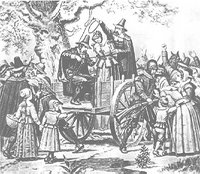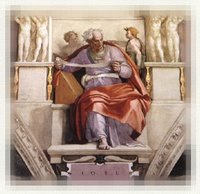
Because The Brits Say It Better
Why We Have a Confession
Charles Spurgeon once remarked on the London Baptist Confession of Faith, saying: "This ancient document is the most excellent epitome of the things most surely believed among us. It is not issued as an authoritative rule or code of faith, whereby you may be fettered, but as a means of edification in righteousness. It is an excellent, though not inspired, expression of the teaching of those Holy Scriptures by which all confessions are to be measured. We hold to the humbling truths of God's sovereign grace in the salvation of lost sinners. Salvation is through Christ alone and by faith alone."
When one wonders why we should have a Confession, why we should espouse a "Faith," or "Tradition of Faith," as opposed to anything other than Scripture, we respond, not with the reply that Tradition is on equal footing with Scripture (see below article), but in the words of C.H. Spurgeon: "Be not ashamed of your faith; remember it is the ancient gospel of the martyrs, confessors, reformers, and saints. Above all, it is the truth of God, against which all the gates of Hell cannot prevail. Let your lives adorn your faith, let your example adorn your creed. Above all live in Christ Jesus, and walk in Him, giving credence to no teaching but that which is manifestly approved of Him, and owned by the Holy Spirit. Cleave fast to the Word of God which is here mapped out for you.’ This new edition of the Confession is sent out as a private venture by a small group of Baptists who are convinced that it has a message for this generation and believe its publication to be long overdue. They hope it will achieve a wide circulation among the churches, and receive the close study which they believe it will richly repay."
As my Elder likes to say: "It would be the height of arrogance to think we could learn nothing from our Fathers."
Thursday, June 29, 2006
Wednesday, June 28, 2006

These Things We Hold...
Tradition & The Word of God
Which is most important? Scripture, or Traditions of men?
Each time we ask that question, a problem rises: Some claim that Ecclesiastic Traditions are instituted by the Holy Spirit, and thus on equal footing with Scripture. Read the words of the Catholic Confession, Second Ed.:
"And [Holy] Tradition transmits in its entirety the Word of God which has been entrusted to the apostles by Christ the Lord and the Holy Spirit. It transmits it to the successors of the apostles so that, enlightened by the Spirit of truth, they may faithfully preserve, expound and spread it abroad by their preaching."
"As a result the Church, to whom the transmission and interpretation of Revelation is entrusted, "does not derive her certainty about all revealed truths from the holy Scriptures alone. Both Scripture and Tradition must be accepted and honored with equal sentiments of devotion and reverence."
Then we ask the question in response; if both Tradition & Scripture must "be accepted & honoured with equal sentiments of devotion & reverence," ... what if the two contradict one another?
For instance, as Luther pointed out, that the Third Lateran Council contradicted the decree of Pope Innocent III, Fourth Lateran Council, 1215, concerning EXTRA ECCLESIUM NULLA SALUS (No Salvation Outside The Holy Roman Church), who - in turn - contradicted the the Papal Bull Unam Sanctam, by Pope Boniface VIII, 1302 (which said that all had salvation who directly fell under jurisdiction of a Roman Pontiff), while the Second Vatican Council declared that all believers constituted the Universal Church, even those outside of Rome...however, many of the Early Church Fathers, as well as St. Thomas Aquinas, the Council of Trent, The Catechism of Pope St. Pius X, Pius XII, & the Vatican II held the notion that whether or not one had implicit or explicit Faith (i.e., proper knowledge of the Roman Catholic Church), a sort of Salvific Grace covered the entire body of believers.
Ummm...so, what were we talking about? Oh yeah! The harmony of Traditions (of men) & the Scripture...yeah...well, maybe not HARMONY, but...
Ok, ok. It would take a far stretch of the Orthodox imagination to make believe that these traditions were inspired, since they contradict one another so often. It would almost tempt me to wonder whether or not one would have to be a heretic to believe in the inspiration of Tradition...
oops; did I just say that? :)
Monday, June 26, 2006
Mercy and truth are met together; righteousness and peace have kissed each other.
For centuries, mankind has asked the question: "How can a Righteous God spare or forgive my wrong?"
Langland's Pier's Plowman illustrates perfectly the picture of Christ & man when it uses the phrase "where righteousness & mercy kiss."
Martin Luther struggled with this question as he slowly moved from the darkness of Catholicism into the light of God's Grace. How, he wondered, can God forgive my sin, and yet still be holy?
The place of God's grace is, however, a place where both His Righteousness (Justice) & His Forgiveness (Mercy) meet, & the sins of God's elect are forgiven.
Yet how, we wonder, can God be Holy, if He is not meting out the punishment we deserve for sin? Is this not inconsistancy? Where is God's Justice?
Because He can accept us with sin, because He grants us that which is not ours, because we deserve nothing but death & Hell, is He no longer Just for giving us Eternal Bliss & Salvation?
Would a Just Judge surely only give what was deserved? It would be like letting someone out on bail when they deserved life in prison, or death.
And that defines the situation exactly.
The reason the modern world often finds this hard to accept is because we live in an age when trust is at a zero. Why, we might ask, would someone pay my bail, when there is nothing in it for them?
Or, even further; why would they accept my sentence and let me go free?
This, is the Paradox of a Righteous & Merciful God.
C.S. Lewis smiled at this paradox and said that he believed it because; "It was exactly opposite of anything we (as humans) could have invented."
This ought to cause Christians to rejoice in the Covenant between themselves & their God, for truly, the Truths found in His Scriptures speak of a place where Righteousness & Mercy kiss, & - as Langland wrote -
'the hearts of men shall know with joy what peace can be in Middle Earth.'
Thursday, June 22, 2006

"Remember that it is not hasty reading, but serious meditation on holy and heavenly truths, that makes them prove sweet and profitable to the soul. It is not the mere touching of the flower by the bee that gathers honey, but her abiding for a time on the flower that draws out the sweet. It is not he that reads most, but he that meditates most, that will prove to be the choicest, sweetest, wisest, and strongest Christian."
THOMAS BROOKS

Witch Hunting
A Rant On Why The White Badger Avoids Scandals & Stories
Ever picked up a Christian Magazine or Newsletter with lines pasted across the cover-page reading: Secrets Shopping Malls Aren't Telling You! ?
Like an edition of The Enquirer, yet smeared with a veneer of religion, these heresy-hunting magazines do nothing but spread emulation and divide the brethren.
Let me pause here and note two things:
First, we at the White Badger Inn are strongly in favour of standing on one's doctrinal convictions. We hold to the London Baptist Confession of Faith, and do not waiver in the face of those who differ from us. This does not mean, however, that we condemn others who vary on minor issues, or issues of liberty.
Second, an article of this sort is rare, since we would be defeating the purpose of standing against heresy-hunters, if we constantly bashed them. We'd end up become the same thing ourselves.
All this being said:
We understand the need to warn. We understand the need to critically examine; however, we also understand the need to be gracious.
...Not tolerant; gracious.
But I must point out the grave difference between this sort of action (slandering men and woman, many of whom are truly children of God), and the actions of - say, John Calvin (who was known to be stern and sober) is primarily this: Calvin approached those whom he had an issue with, and dealt with the problem Biblically.
Is it not Scriptural to approach a brother if you have ought against him?
Then why oh why do the Heresy-hunting folks who produce so many of the fundamentalist-style papers slander and libel others who differ from them, without truly addressing the perceived problem?
However, while this is a great Biblical issue which gets me heated...the real issue that irritates me the most is just getting sick and tired of how they complain about everything. Everything is - to them - a sin. Everything is wrong. The world is coming to an end. Bush is the Antichrist. The U.S. is the new Rome. Bill O'Reilly is Satan.
I have sworn off these Witch-hunting papers. I will not pick one up. And though the cover of one may tempt me to peek within the pages and ridicule the author, I will not. I have stopped keeping them on the back of the commode (yes, I really did), and I think I am going to take up something more calming.
Perhaps Rhinoceros hunting, or fishing. Maybe a trip to Salem...
Or not.
Wednesday, June 21, 2006

Thine Eye Diffused A Quick'ning Ray
Why White Badger Inn Rejects Synergism
What is Synergism? Webster defines it this way:
"Synergism – interaction of discrete agencies (as industrial firms) or agents (as drugs) such that the total effect is greater than the sum of the individual effects"
Theologically, Synergism is a doctrine that defines the human will as cooperating with Divine grace in the work of regeneration.
Can we at White Badger Inn find scriptural warrant for the doctrine of Synergism? No. We agree with the Protestant reformation, where the Reformers emphatically stated that we are totally unable to come to Christ unless God Himself does a complete work of regeneration in us by grace alone (Sola Gratia).
So we ask, "What does the Scripture say?" (Gal.4: 30) And the Scriptures respond with: "Search the Scriptures, for in them ye think ye have eternal life: and they are they which testify of me. And ye will not come to me, that ye might have life." (John 5:39, 40).
Case closed.

Is Calvin Dead?
The Relevancy & Implications of John Calvin's Teachings
No one can deny the awesome extent of John Calvin's teachings (1509-1564). It is difficult to lay a finger on the beginning or end of his influence, since much of it overlaps the influence of the gospel, as well as protestantism and the ideologies of the Rennaisance.
However, it is just this point which makes Calvin's teachings so relevant.
The Rennaisance owes much of its "discoveries" to the proper humanities of the Reformation. For this reason, Luther, the German Reformer, was called a Humanist...not in the sense that we now think of, but because he understood that every man (and woman) has a personal obligation to God, which cannot be fulfilled by an earthly mediator (aka: a priest).
If volume and widespread translation mean anything (they don't always), Calvin is certainly relevant, since he wrote over three massive volumes of sermons, a treatise on The Christian Life, one entitled On Prayer - A Perpetual Exercise of Faith. The Daily Benefits Derived From It, Institutio Christianae Religionis (Institutes of the Christian Religion), four volumes on the Harmony of the Law, commentaries on forty books of the Bible, and sundry other volumes which have reaffirmed the Orthodox views of the Scripture, and the foundations for much of Christendom today.
However, it is something else entirely, which makes Calvin so relevant for Christendom today...
The spirit of Zwinglianism reached its fullest development in the theological principles, political theories, and ecclesiastic thought of John Calvin. Perhaps even more so than Martin Luther, Calvin envisioned and wrought the framework that would come to dominate Western culture, even into the twenty-first century. Our own culture, staggeringly so, is decidedly Calvinistic in some form or another; thus, at the centre of the way we think and act, you will find the indominable spirit of this fiery reformer.
And, while the controversy rages over Calvin's teachings, even among those of like denominations, the key to understanding his importance lies in the Scriptures. At the heart of all that he taught, was the premis Sola Scriptura; The Scriptures Alone, or The Scriptures Alone Suffice.
With this premise, the structure for society, the church, and political authority could be properly understood and applied, Calvin maintained, though fiercely opposed by those (like Luther) who argued that all which was not expressly forbidden in Scripture was to be allowed.
Was this, perhaps the reason that Calvin's influence is still felt today...or was it the fact that he bowled on the Sabbath?
(See: Calvin in the Hands of the Philistines: Or, Did Calvin Bowl on the Sabbath? By Chris Coldwell)
Tuesday, June 20, 2006

"THE REST OF US"
A General Rant On Postmodernism
Every good discussion on Postmodernism ought to begin with the question; what is Postmodernism? Not because we assume others are ignorant of its definition (they often are), but because it stands to good reason to discuss something on an understood basis, where the definitions are laid out beforehand.
Postmodernism is a cultural worldview that defines much of our society. And while Postmodernism espouses the importance of spirituality, it combines this value with those of pluralism, the experiential, relativity, altruism, community, creativity, the arts, environmentalism, globality, holism, and authenticity.
Many Christians value the arts, creativity, etc., however, with just the right mix of spiritual and secular, Postmodernism somehow manages to create a fantastic form of heresy which has not been felt so strongly since Ante-Nicene times.
In many ways we are transitioning away from the "modern" values of rationalism, science, dogmatism, individualism, pragmatism, capitalism, nationalism, compartmentalism, and veneered religiosity; into this "feel-your-way-around" world of Postmodernism. Some churches have begun to adopt this stance, resulting in a shallow, emotionally-based religion.
And while some root for these results (i.e., the fact that much of the world is now "spiritually-minded"), as Rushdooney once preciently observed: "Most religions are not theistic at all."

Arise my body, my small body, we have striven
Enough, and He is merciful; we are forgiven.
Arise small body, puppet-like and pale, and go,
White as the bed-clothes into bed, and cold as snow,
Undress with small, cold fingers and put out the light,
And be alone, hush'd mortal, in the sacred night,
-A meadow whipt flat with the rain, a cup
Emptied and clean, a garment washed and folded up,
Faded in colour, thinned almost to raggedness
By dirt and by the washing of that dirtiness.
Be not too quickly warm again. Lie cold; consent
To weariness' and pardon's watery element.
Drink up the bitter water, breathe the chilly death;
Soon enough comes the riot of our blood and breath.
CS Lewis






